LInks for blogposts Shopify Made Easy
There are several articles dedicated to all of the Shopify ‘Settings’ section to set up your online business.
1. How Important Is Your Business Information In Shopify #3
Business information for your Shopify store is the foundation of your online store to keep your protected.
2. Setup Your Financials In Shopify.
Payment options, checkout and understanding of your money is important. Here are 4 articles dedicated to the 'Payment' options in your 'Settings' in Shopify.
- How To Set Up Your Financial Information In Shopify? #4
- How To Set Up PayPal Express & Amazon Pay In Your Shopify Store #4
- How To Get Paid From Your Payment Provider In Shopify? #4
- How To Set Up Your Checkout Your Shopify Store #4
3. How To Set Up Your Shipping & Distribution Locations In Your Shopify Store #5
Set up your locations and rates of your store so the process is seamless.
4. How To Set Up & Optimize Your Automated Email Notifications in Shopify #6
Personalize your email notifications with your brand and voice.
5. How To Set Up All Your Legal Requirements In Shopify #7
Your legal documentation for your eCommerce store to protect your business.
6. How Optimize Your Automated Email Notifications in Shopify #6
RELATED ARTICLES FOR YOUR PRODUCT PAGE IN SHOPIFY:
1. How To Create Successful Products Pages In Your Shopify Store
2. How To add Your Products Manually In Your Shopify Store
3. How Add Product Photos, Images & Video To Your Shopify Store
4. Tips How To PRICE Your Product sFOR Your Shopify Store
5. How Add Your Product Information For Your Shopify Store
6. Shipping Information For Your Products In Your Shopify Store
7. How To Add Product Options & Variants In Your Shopify Store
8. How To Optimize Your Product Page For Google In Shopify
9. How To Sell More Products With Sales Channels In Your Shopify Store
10. Strategically Organize Your Products For More Sales In Your Shopify Store
11. Optimize Your Product Pages For Great Conversions In Your Shopify Store
12. How To Upload Your Products In Bulk To Shopify
13. How To Create 2 Types Of Gift Cards In Your Shopify Store
MORE INFORMATION ABOUT CONTENT FOR EACH ARTICLE ABOUT PRODUCT PAGE IN SHOPIFY: Check it out here.
1. How To Create Successful Products Pages In Your Shopify Store
What to expect in this article: #1
- Ecommerce Conversion Facts
- Path of Potential Buyer
- What Makes a Successful Product Page?
- 9 Key Elements for an Effective Product Page
2. How To add Your Products Manually In Your Shopify Store
What to expect in this article: #2
Integration of Products in Your Shopify Store
- Add/Upload Your Products Manually
Adding Information For Your Products in Your Shopify Store
- Title
- How to Write A Good Product Title
- Tools
- Description
- Difference Between Features & Benefits
- 7 Easy Rules to Write Product Descriptions
- Should you use the same descriptions/content as your manufacturer/vendor
3. How Add Product Photos, Images & Video To Your Shopify Store
What to expect in this article: #3
Photos, Images & Videos
- 7 Types of Images for Your Product Page
- Add Images for Your Product Page
- Ideas to Enhance & Improve Your Product Image
- Add Videos to Your Product Page
- What type of video?
- How to Add Videos to Your Product Page
4. Tips How To PRICE Your Product sFOR Your Shopify Store
What to expect in this article: #4
Prices & Cost per item
- Quick Lesson About Prices, Costs and Profits
- Break-even Analysis
- How to Use the Breakeven Analysis
5. How Add Your Product Information For Your Shopify Store
What to expect in this article: #5
- Inventory
- SKU = Stock Keeping Unit
- Barcode (ISBN, UPC, etc)
- Quantity - Available & Incoming
- Locations
6. Shipping Information For Your Products In Your Shopify Store
What to expect in this article: #6
- Type of Product: Physical or Digital products
- Difference between Physical & Digital Products
- How to add a digital product
- Shipping
- Weight (for physical products)
- Custom information for international shipping
7. How To Add Product Options & Variants In Your Shopify Store
What to expect in this article: #7
- Options and Variants
- How to add options and variants
8. How To Optimize Your Product Page For Google In Shopify
What to expect in this article: #8
- Search engine listing preview
- What is a meta description tag?
- Where do I find the Meta Descriptions?
- Page Title
- Description
- URL and handle
- Additional Ideas for Your Product Page
- Product Conversion Support Content
9. How To Sell More Products With Sales Channels In Your Shopify Store
What to expect in this article: #9
- Product Availability
- Scheduling Product Launch
- Product Sales Channels
10. Strategically Organize Your Products For More Sales In Your Shopify Store
What to expect in this article: #10
- Organizing Your Product Pages
- Types
- Vendor
- Collections
- Tags
11. Optimize Your Product Pages For Great Conversions In Your Shopify Store
What to expect in this article: #11
Shopify Product Templates
- Free Themes
- Examples of Product Templates
- Paid Themes
- Examples of Product Templates
12. How To Upload Your Products In Bulk To Shopify
What to expect in this article: #12
- Upload Your Products in Bulk
- Upload With Shopify file
- Upload With Apps
13. How To Create 2 Types Of Gift Cards In Your Shopify Store
What to expect in this article: #13
- Gift Cards
- Redeeming Gift Cards
2. How To add Your Products Manually In Your Shopify Store
What to expect in this article: #2
Integration of Products in Your Shopify Store
- Add/Upload Your Products Manually
Adding Information For Your Products in Your Shopify Store
- Title
- How to Write A Good Product Title
- Tools
- Description
- Difference Between Features & Benefits
- 7 Easy Rules to Write Product Descriptions
- Should you use the same descriptions/content as your manufacturer/vendor
More In-Depth Articles For Your Shopify Store
This is part of a comprehensive series of articles about successfully adding your products to your Shopify store. I have added more than just the basic information of adding your products to Shopify. These articles will give you a more in-depth understanding of the information you need to create a great product page and get amazing conversions.
MORE INFORMATION ABOUT CONTENT FOR EACH ARTICLE FOR PRODUCT PAGES IN SHOPIFY: Check it out here.
Ecommerce Success Blogs
How to Set Up Customer Accounts in Shopify
Let me ask you something — how many customers have you lost because your login process was a pain?
Here's the thing most store owners miss: customer accounts aren't just a "nice to have" setting buried in your Shopify dashboard. They're the foundation of repeat business, self-serve returns, store credit, and the kind of seamless shopping experience that turns one-time buyers into loyal fans.
And the good news? Shopify has made this ridiculously simple — if you know which settings to activate and why they matter. That's exactly what I'm walking you through today.
Whether you're running a B2B operation or a direct-to-consumer store, this guide covers everything: the recommended passwordless login (yes, no more forgotten passwords!), social sign-in with Google and Facebook, self-serve returns, and store credit visibility. Let's get your customer accounts set up properly — once, the right way.
📖 Want the complete Shopify setup system? My book Shopify Made Easy walks you through every setting, every optimization, and every shortcut I've learned coaching entrepreneurs to 7-figure stores. Grab your copy here →
Step 1: Navigate to Customer Account Settings
From your Shopify Dashboard, head to Settings → Customer accounts. This is your command center for everything related to how customers create accounts, log in, and manage their orders.
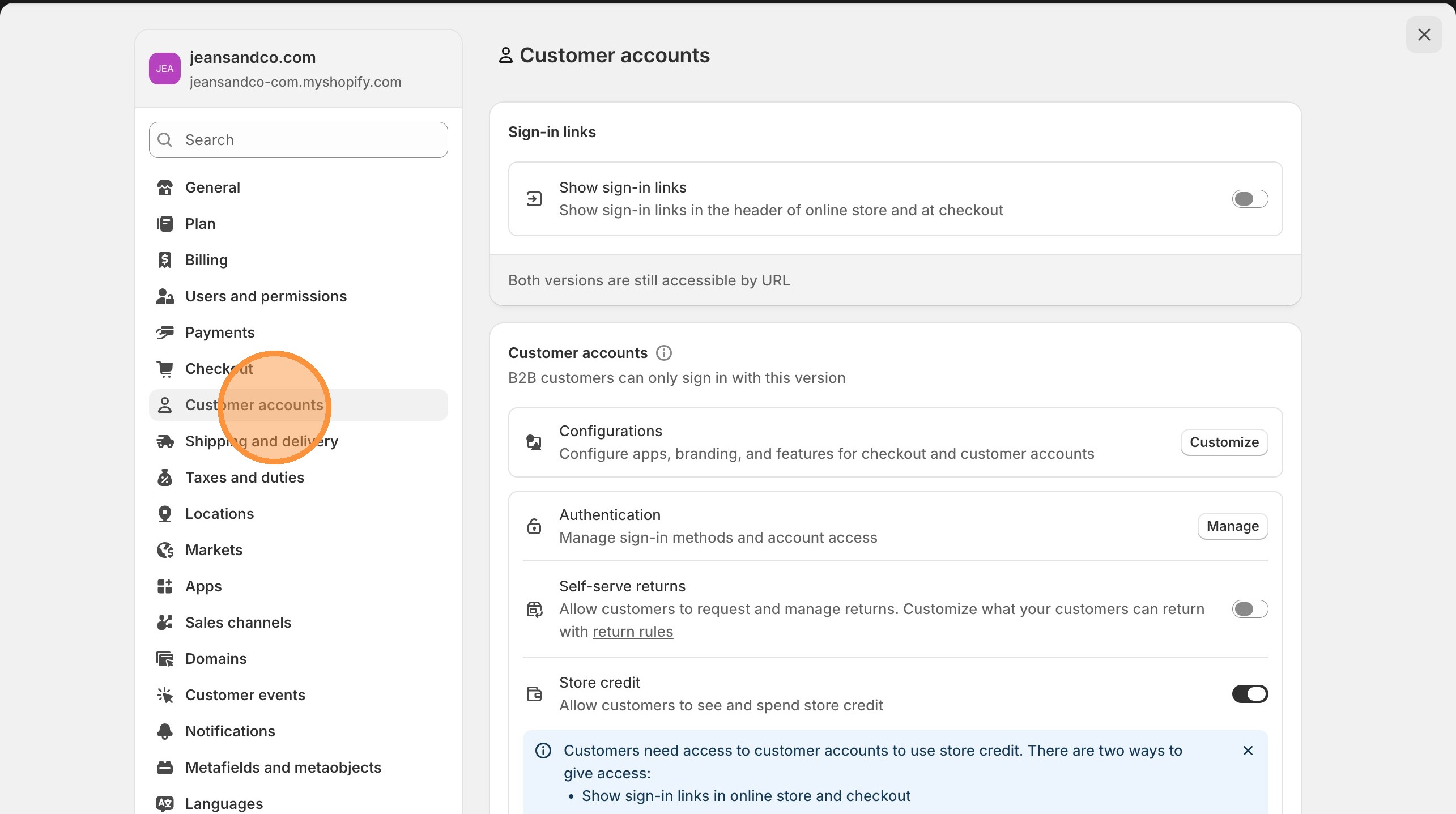
Step 2: Activate Sign-In Links
The first setting you'll see is Sign-in links. When you activate this, sign-in links will appear in the header of your online store and at checkout. This is non-negotiable — your customers need to see where to log in without hunting for it.
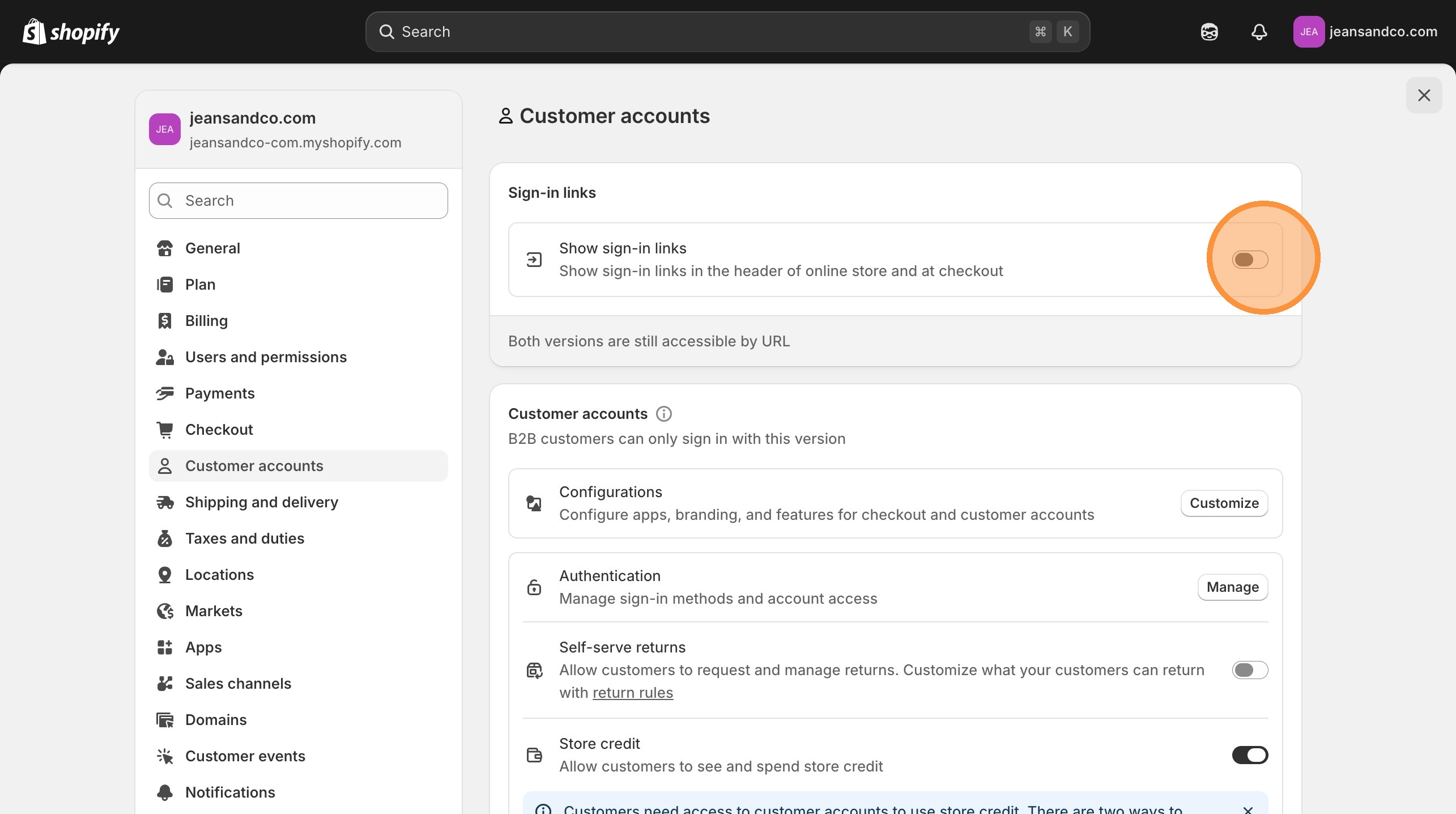
Step 3: Choose Your Account Type (This Matters More Than You Think)
Now you have two choices, and this decision impacts your entire customer experience:
Option 1: "Customer accounts" (RECOMMENDED) — Customers sign in with a one-time code sent to their email. No passwords to remember, no reset emails, no friction. This also works with B2B.
Option 2: "Legacy" — The old-school method where customers create an account with email and password.
My recommendation? Go with "Customer accounts" every time. Shopify recommends it too, and here's why: every forgotten password is a potential lost sale. The one-time code method eliminates that friction completely. Your customers open their email, click a code, and they're in. Simple.
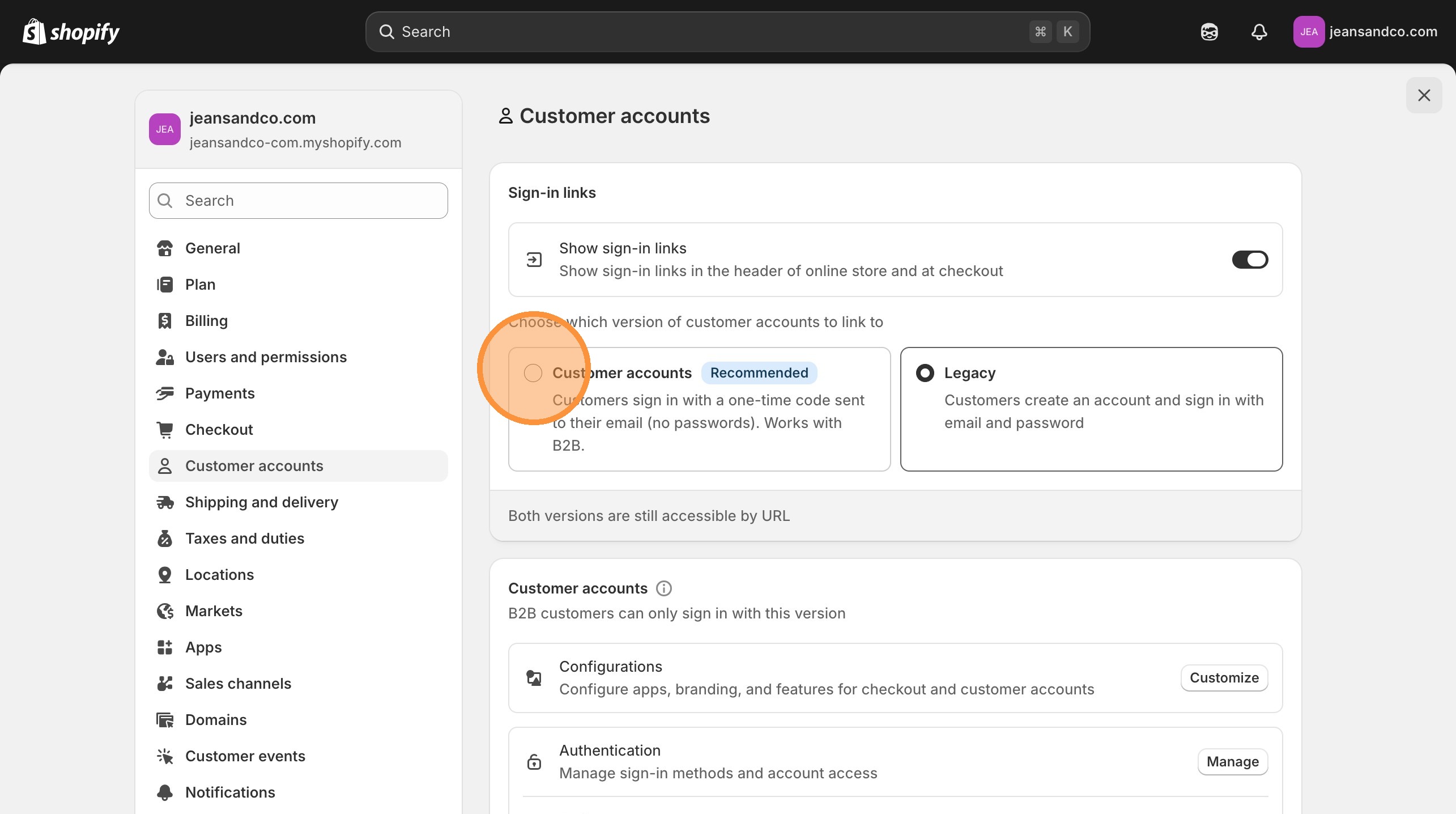
Step 4: Customize Your Configuration
In the Configurations section, click the "Customize" button. This takes you to the settings that configure apps, branding, and features for both checkout and customer accounts. Think of this as the bridge between your account settings and how they actually look and feel to your customers.
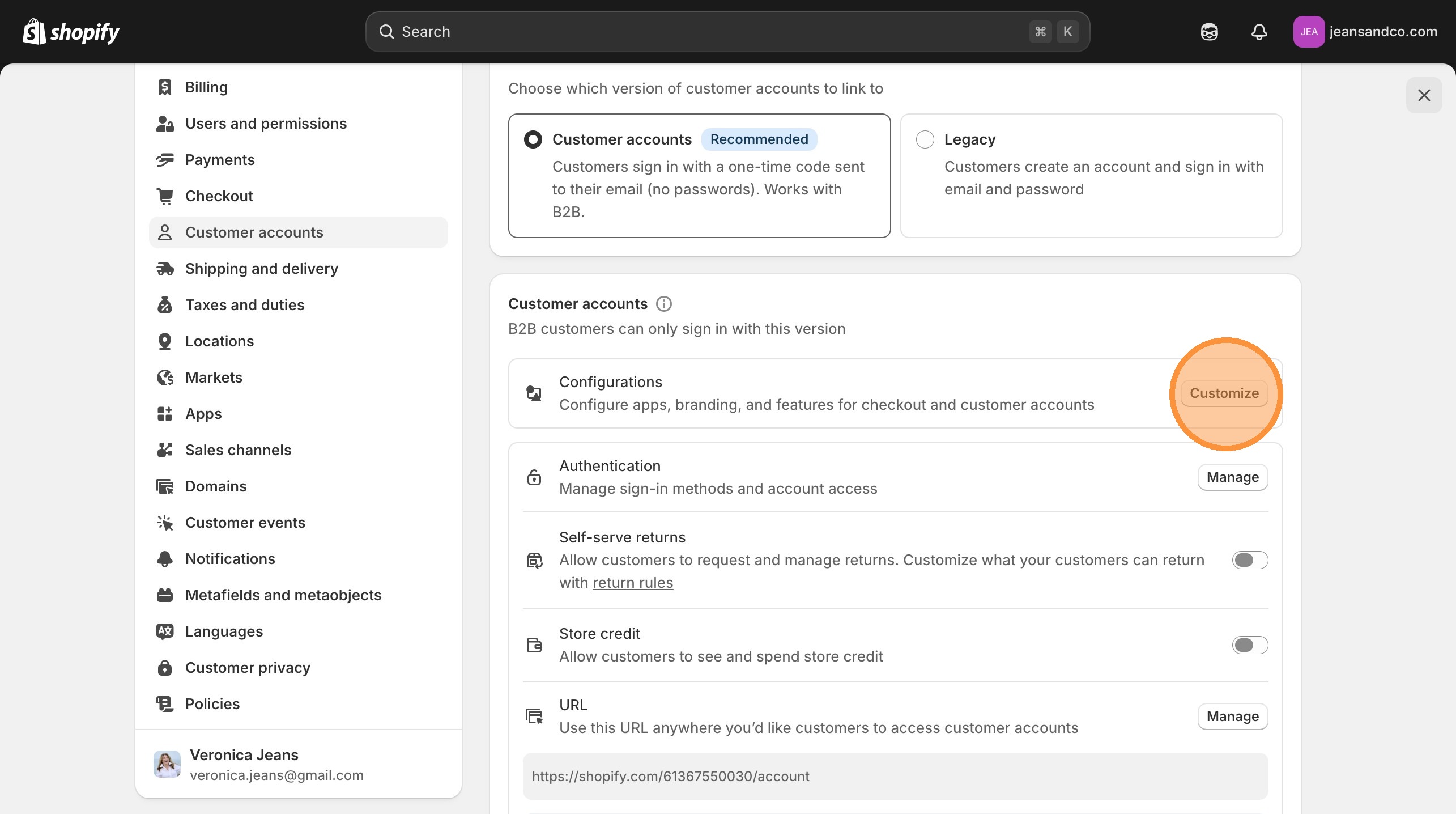
Step 5: Access the Checkout Theme Editor
You'll land on the Checkout setting page. Click "Customize" again to open the checkout page in the Theme Editor. This is where you can visually design how your checkout and customer account experience looks — matching it to your brand is essential for building trust.
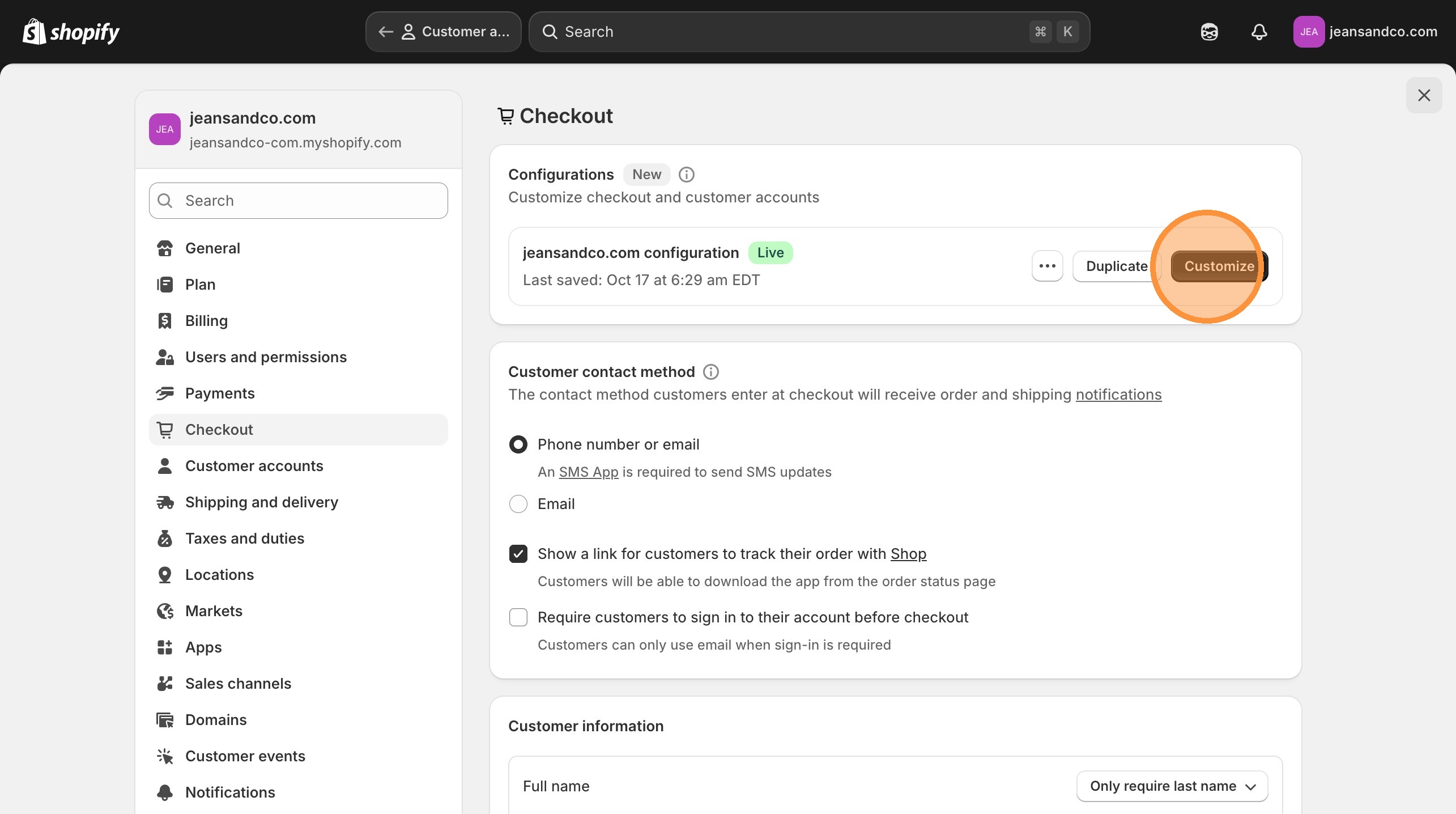
Step 6: Set Up Authentication Methods
Here's where it gets interesting. In the Authentication section, you can manage sign-in methods and account access. Click "Manage" to see all the ways you can allow your customers to log in.
If your goal is to make signing in as frictionless as possible (and it should be), this is where you enable social sign-in options like Google and Facebook.
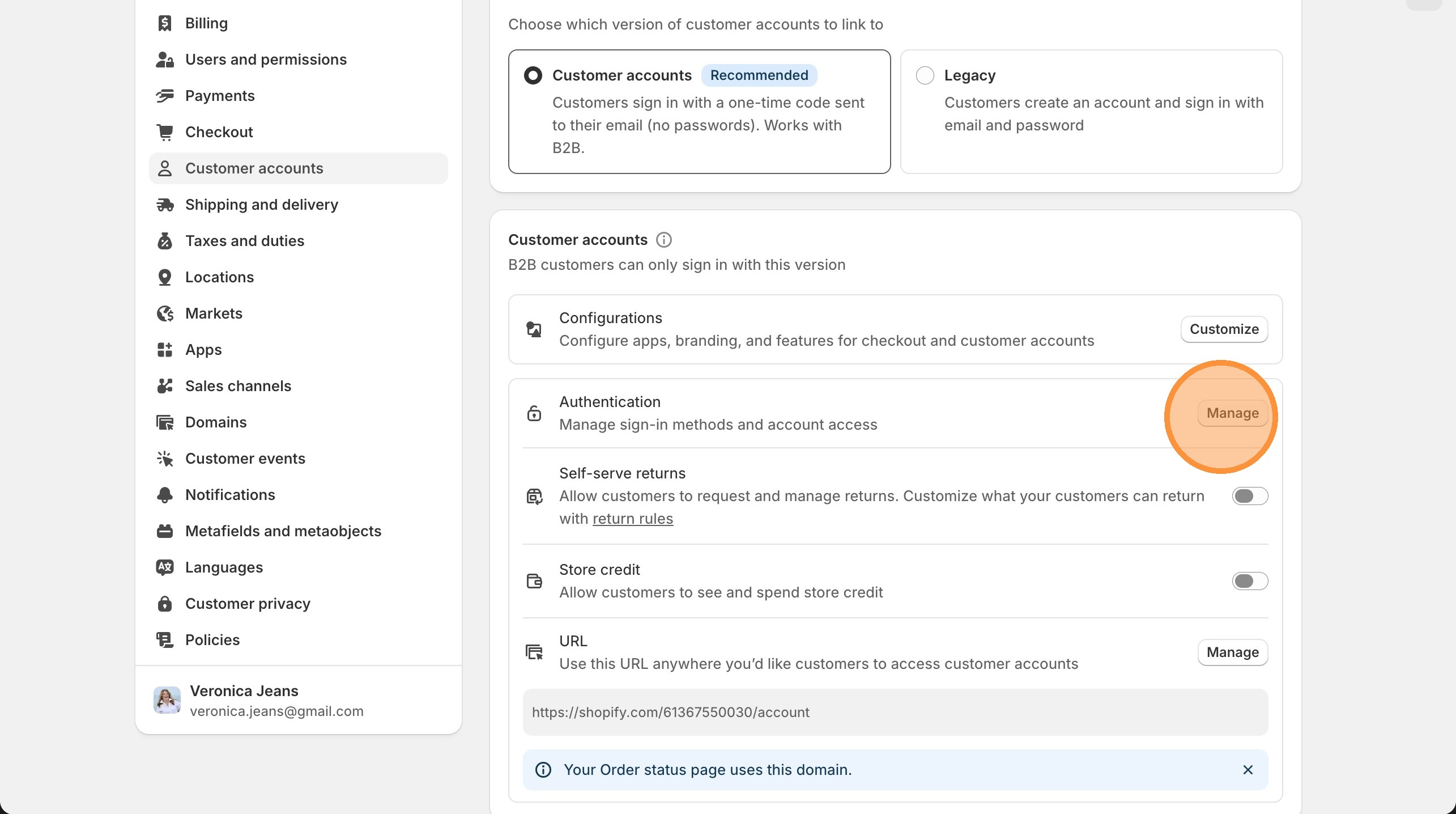
Step 7: Enable Social Login Options
You have four authentication methods available:
- Shop — Shopify's own login system
- Google — Let customers sign in with their Google account
- Facebook — Let customers sign in with their Facebook account
- Shopify — Your default login (always active)
Click "Connect" next to Google and Facebook to configure these. Here's my take: enable both. Your customers already have these accounts, and every extra step you remove from the login process is another barrier eliminated between them and their purchase.
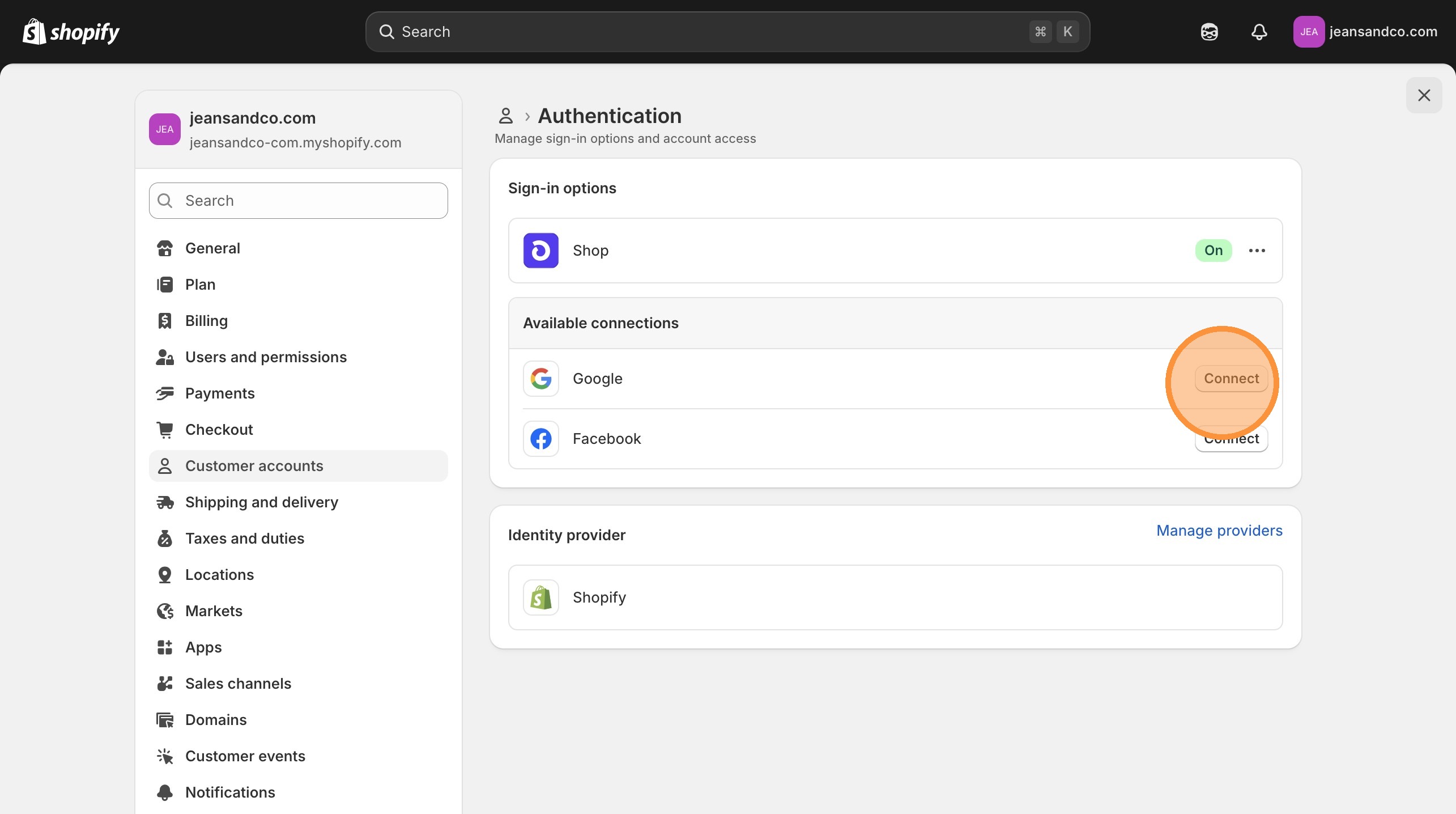
💡 Pro Tip from my consulting work: Stores that enable social login see higher account creation rates because customers don't have to create yet another password. I cover the complete checkout optimization strategy in Shopify Made Easy — including the settings most store owners never touch.
Step 8: Configure Self-Serve Returns and Store Credit
This is the part that separates professional stores from amateur ones. In the customer account settings, you can:
Enable Self-Serve Returns — Allow customers to request and manage returns directly from their account. No more back-and-forth emails. Customize what your customers can return using your return rules, and make sure to add your customer accounts URL to your written return and refund policy, your footer, and anywhere else customers might look for return information.
Enable Store Credit Visibility — Allow customers to see and spend their store credit balance. This is a powerful retention tool — when customers know they have credit waiting, they come back.
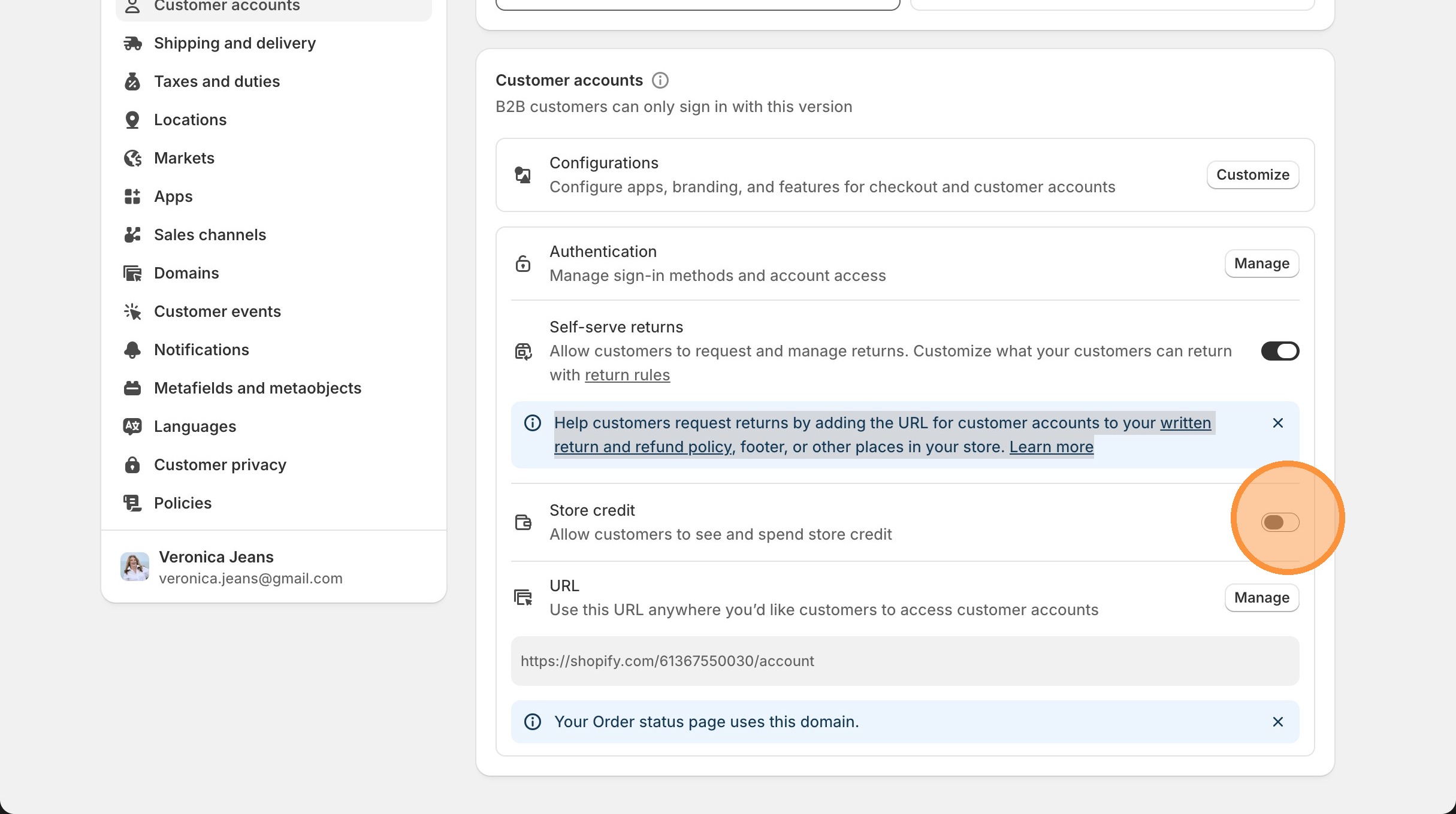
Step 9: Set Up Your Customer Accounts URL
Shopify provides a dedicated URL for customer accounts. Use this URL anywhere you want customers to access their accounts — your order status page already uses this domain automatically.
Add this link to your navigation menu, your footer, your order confirmation emails, and your return policy page. The more places customers can find their account, the less support tickets you'll receive.
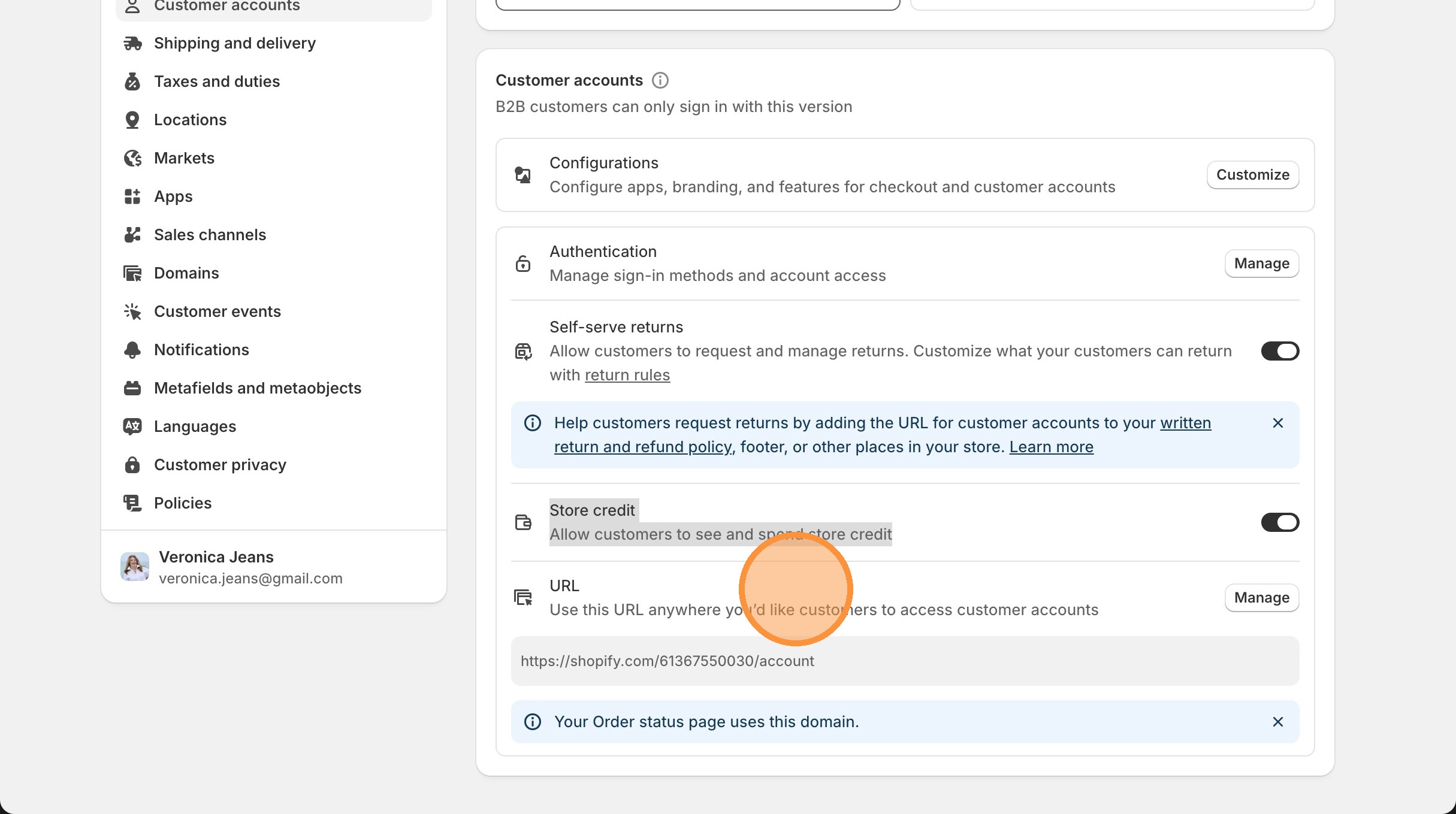
Step 10: Connect Your Custom Domain (Optional but Recommended)
Click "Manage" to create a sub-domain with your host provider for your customer accounts. This means instead of a generic Shopify URL, your customers see something like accounts.yourstore.com — which looks professional and builds brand trust.
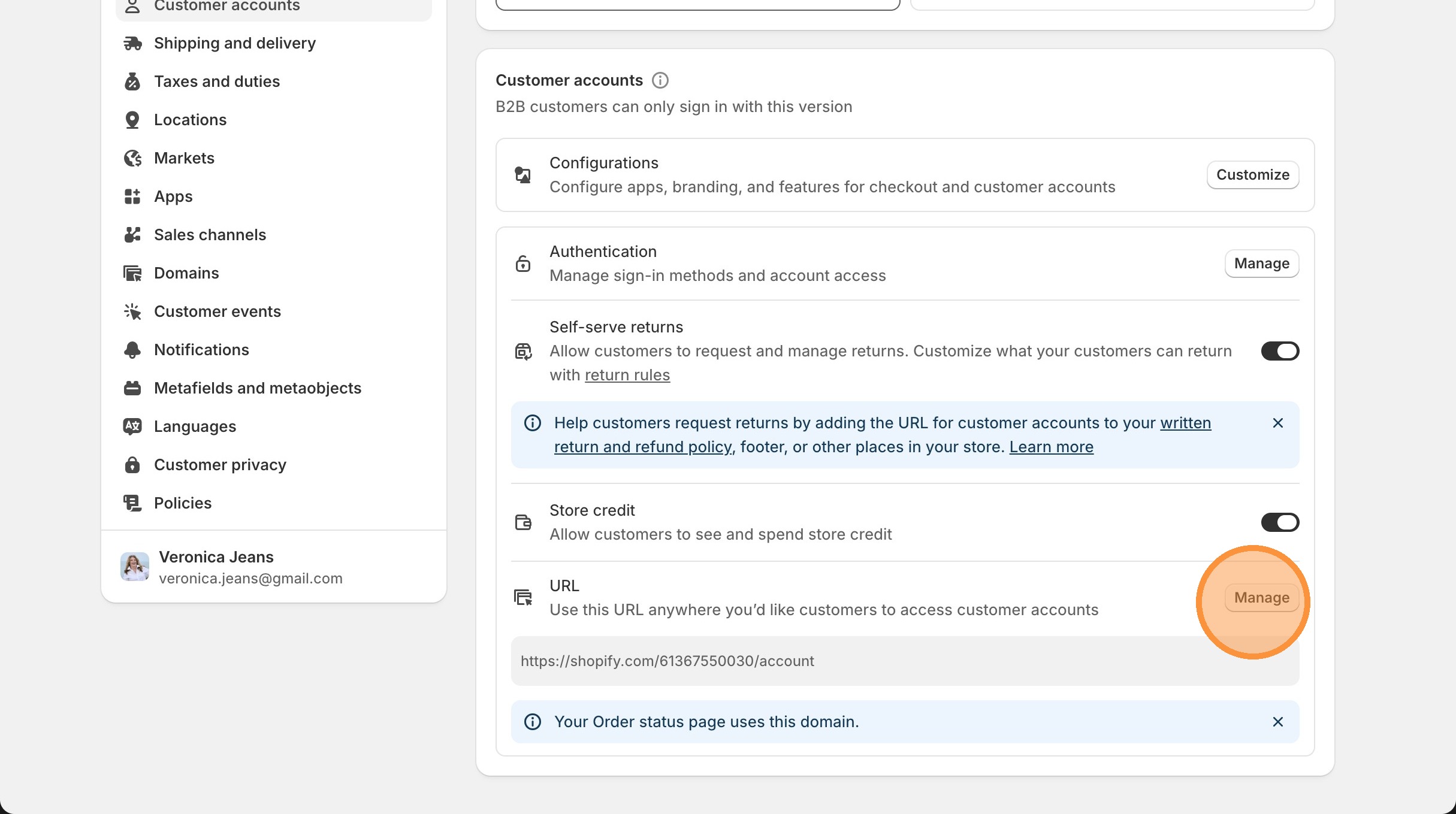
Why This Setup Matters for Your Bottom Line
Let me connect the dots here. Customer accounts aren't just about convenience — they're about building a business that generates repeat revenue without you working harder:
Repeat purchases: Customers with accounts have their shipping info saved, their order history visible, and store credit waiting. That's three reasons to come back without you sending a single email.
Reduced support costs: Self-serve returns mean fewer "where's my refund?" emails clogging your inbox. Your customers handle it themselves, and you approve or deny from your dashboard.
Better marketing data: Account holders give you richer customer data for segmentation. You know what they've bought, when they bought it, and what they browse — which means your email marketing gets smarter.
B2B ready: If you're thinking about wholesale or B2B sales, the new customer accounts system supports it natively. One setup, both channels covered.
Related Guides to Optimize Your Shopify Store
Setting up customer accounts is one piece of the puzzle. Here are some related guides to help you build a store that actually works for you:
- The Year Your Business Actually Works for You — The planning system behind every successful store
- Daily Task Management in the AI Era — What humans do when AI handles the rest
- Content Creation & Distribution Strategy for 2026 — The AI-powered system that works
- Monthly Sprint Planning — Turn quarterly goals into daily wins
- The 90-Day Planning System — Turns targets into revenue, not just hope
Frequently Asked Questions
What's the difference between "Customer accounts" and "Legacy" accounts in Shopify?
"Customer accounts" uses a modern passwordless login — customers receive a one-time code via email to sign in. No passwords to remember or reset. "Legacy" is the traditional email-and-password method. Shopify recommends the newer "Customer accounts" option because it reduces friction and supports B2B functionality. Most stores see better account creation rates with the passwordless option.
Can I enable Google and Facebook social login on my Shopify store?
Yes. In your customer account settings, go to the Authentication section and click "Manage." You'll see options to connect Google and Facebook as sign-in methods alongside Shopify's default login and Shop. Click "Connect" for each platform to configure them. Enabling social login reduces signup friction because customers can use accounts they already have.
How do I set up self-serve returns in Shopify customer accounts?
Enable self-serve returns in your customer account settings. This allows customers to request and manage returns directly from their account page. You'll want to customize your return rules in Settings → Legal, and add your customer accounts URL to your written return policy, store footer, and order confirmation emails so customers can easily find the self-serve option.
Should I use a custom domain for my Shopify customer accounts?
Yes, setting up a custom sub-domain (like accounts.yourstore.com) for customer accounts is recommended. It looks more professional than a generic Shopify URL, builds brand trust, and gives customers confidence they're interacting with your store. You can set this up through the "Manage" option in your customer accounts settings, which connects to your domain host provider.
Do Shopify customer accounts work for B2B and wholesale stores?
Yes. The modern "Customer accounts" option (not Legacy) natively supports B2B functionality. This means you can manage both direct-to-consumer and wholesale customers through the same account system. B2B customers get access to company-specific pricing, payment terms, and order management — all through the same customer account infrastructure.
How does store credit work with Shopify customer accounts?
When you enable the store credit setting in customer accounts, customers can see their available credit balance and spend it at checkout. Store credit is a powerful retention tool — customers who know they have credit waiting are more likely to return and make another purchase. Enable this in your customer account settings under the store credit section.
Where should I add links to customer accounts on my Shopify store?
Add your customer accounts URL in multiple locations: your store header navigation, footer menu, order confirmation emails, return policy page, and the order status page (which uses it automatically). The more accessible your account login is, the fewer support tickets you'll receive about order tracking, returns, and account access.
Ready to Build a Shopify Store That Actually Works While You Sleep?
Customer accounts are just one piece of a properly optimized Shopify store. My book Shopify Made Easy gives you the complete system — from setup to scaling — based on everything I've learned coaching entrepreneurs to 7-figure businesses and teaching eCommerce at university level.
Available in paperback, eBook, and digital download
1. Why Most eCommerce Entrepreneurs Fail at Business Planning (And How to Actually Make It Work)
Stop wasting time on business planning that goes nowhere.
7. Monthly Review Process 2026: Measuring What Actually Matters (Including AI Discovery Metrics)
Learn the complete 2026 monthly review framework that combines traditional eCommerce metrics with new AI discovery metrics.

